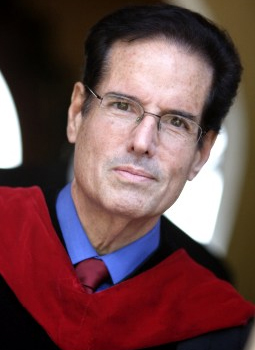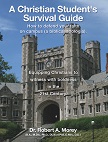Review: Grace, Faith, Free Will, by Robert E. Picirilli
By Dr. Robert A. Morey
https://njiat.com/apologetics.html
A fellow Faith Defender sent me this book in the hope that I would find the time to look it over. By this time in my life, I have read thousands of books on salvation and finally wrote Studies in the Atonement as my mature thoughts on the subject. The main problem with 99% of the books on this issue is that they fail to:
A. Define their doctrine by carefully defining their words and terms clearly. For example, if they use the noun “will” and the adjective “free” without ever defining either word, no one knows what they talking about.
B. Document their doctrine from Scripture by careful exegesis that is hermeneutically sound. If they cite a verse and then go on with their argument without examining the grammar, syntax, and context of the verse, they are guilty of proof texting.
C. Defend it by answering any arguments that have been raised against their position. They must document these arguments against their position and not make up straw man arguments.
D. Defeat other views by presenting what they teach from their own documents and not misrepresenting what they believe.
Dr. Picirilli is a professor at the Free Will Baptist Bible College in Nashville, TN. This gave me hope that maybe I might have found a Free Will Baptist who had an IQ higher than a snail.
In over thirty years of dealing with Free Will Baptists, I have asked pastor after pastor to define the noun “will” and the adjective “free” and then the phrase “free will.” Then I asked them to show me where the words “free will” are found in the Hebrew and Greek text of Scripture.
Sad to say, all I ever got was a blank look on their faces. They could not define their words clearly and could not show me a single verse in the Hebrew and Greek where “free will” could be found. They all quoted “free will offerings” (KJV) but then were confused when I pointed out those words are not in the Hebrew text.
But Dr. Picirilli is a professor of NT Greek and the academic Dean of the Free Will Baptist Bible College. Surely I would find intelligent answers of the issues.
First, it ticked me off from the beginning when Dr. Picirilli misrepresented what the Reformed Faith teaches. Here is what he said:
We must make no mistake on this: the traditional
Calvinist position is that salvation is not by faith…[1]
I immediately looked to see if Picirilli gave any Documentation to support his claim. Nothing, nada, zip!
The Westminster Confession of Faith is the greatest of the Reformed Creeds and yet nowhere does it say “salvation is not by faith.” Indeed, I could not find where Calvin, Hodge, Shedd or any other Reformed theologian said “salvation is not by faith.” I can truly say that I have never said such a stupid statement as “salvation is not by faith” and have never read or heard of any other Reformed theologian saying it.
Since Picirilli misrepresents what Calvinists teach, this does not bode well for his “discussion.”
The second issue is whether he defines the noun “will” and the adjective “free” and then documents his definitions from the Hebrew and Greek Scriptures. Once again, I was disappointed.
The closest he came was on pages 41f. He asserts that man has a “will” but does not define what it is. Neither does he supply us with a single Hebrew or Greek word for his idea of ‘will.” But he does quote from the neo-Process heretic Clark Pinnock, who denied most fundamental doctrines of the Bible.[2] He denied the doctrine of hell but, now that he is dead, he knows it exists first hand!
But whatever he means by the word “will” he assures us it is free, limited, and not absolute, etc. But such distinctions are meaningless as long as X (will) is not defined. The same is true with the adjective “free” and the phrase “free will.” He fails to define what “X” is and does not establish that “X” is found in Scripture.
Picirilli does not give evidence that he has ever studied the different ideas of “free will” in the history of ideas all the way back to their origins in Greek philosophy. I doubt the idea of doing so ever crossed his mind. If he did, he would discover that “free will” is not found in the Hebrew or Greek Scriptures because it was never a part of biblical anthropology.
The word “will” today is usually understood in terms of some vague Post-Renaissance psychological system such as Faculty Psychology. “Man” is said to be made up of three “substances”: mind, emotions, and will. Of course, the word “substance” is a meaningless term as well as “mind, emotions, and will.” We do not have a “will” rattling around inside of us somewhere. Neither do we have a “mind’ or “emotions.”
What this means is that all discussion s of whether the “will” is “free” or “in bondage” is a waste of time because no one can define the word “will.” Calvinists are just as guilty of this as well.
I believe that it is impossible to define the modern word “will” without using post-biblical pyscho-philosophical concepts not only foreign to Scripture but antithetical to its view of man. There is no Hebrew or Greek word that is parallel to modern anthropological concepts of will, mind or emotions. You cannot take ancient pagan Greek concepts or modern Western European concepts and read them into ancient Jewish literature.
Picirilli’s book is a bummer because he fails to define his other terms he uses. Take his term “universal atonement.” Does he attempt to define “universal” or “atonement” with any precision? No.
I usually help out Arminians by suggesting the following definition for the word “universal.”
Every human being
since Adam
to the last baby born
before the end of the world
who died in miscarriage or in infancy or later in life
including those in hell and heaven
at the time Christ died.
They have to find a verse in the Bible where the author understood and expressed that concept of “universal.” It is not as easy as you think.
Whenever they cite a verse that has the words “all”, “everyone,” and “world,” I have them substitute the definition above in the place of the word. For example, 1 Tim. 2:1 says to pray for “all men” i.e. “every human being since Adam to the last baby born before the end of the world who died in miscarriage or in infancy or later in life including those in hell and heaven at the time Christ died.” This is, of course, absurd. Paul is not saying we have an obligation to pray for the dead or those not yet born or those in hell or heaven at this time.
In passage after passage where the words “all” or “world” appear, if you plug in the definition of universal, it is obvious that those words do not mean “universal” in the Arminian sense. Even Picirilli admits on page 111, “…one may readily admit that “all” does not mean every human being exhaustively…”
I have a suspicion that the Western European concept of “universal” never crossed the mind of the Jewish authors of the Old or New Testaments. Western Europeans like Arminius and Calvin often read Renaissance ideas back into Scripture and thus only did eisegesis, not exegesis. To debate whether man has a free will or a will in bondage to sin assumes the Renaissance concept of the “will” as the “given.”
It is time to go back to our Jewish roots and dump all the Western European Gentile ideas and doctrines from exegesis and remember that the New Testament is just as Jewish as the Old Testament. I document this in my books, Is Eastern Orthodoxy Christian? and The Bible, Natural Law and Natural Theology.
The “Babylonian Captivity of the Church” refers to the transition from the Messianic Jewish Church to a Gentile church filled with such pagan ideas as veneration of icons, statues, prayers to the saints, etc. I believe that “free will” was a pagan doctrine brought into the church by Gentile converts like Origin who retained their pagan ideas.
Picirilli fails to give a precise definition of the word “atonement.” If you turn to the Bible, you will find terms (such as propitiation) that state that the death of Messiah actually accomplished or secured something concrete. For example, Heb. 9:12 states Messiah’s death as “having secured [aorist participle] eternal redemption.” Amazingly, Picirilli did not discuss this key text.
The author’s wrangling (pgs. 103f) over whether Christ’s death created only the possibility of redemption for all or actually accomplished it for some is boring. He is a rationalist who enjoys batting ideas back and forth like a ping pong game. This is why his point and counter point methodology is a meaningless exercise in what Romans 1:21 calls “vain speculations.” I want hard core biblical exegesis, not verbal ping pong games.
This highlights the real problem with this book. Up to 90% of the book is engaged in contrasting the opinions of man. One Calvinist says this but an Arminian says that. Who cares? I don’t care what Calvin or Arminius said. They were not inspired and were men of their times and had many foolish ideas.
I want to know what the Bible has to say about the nature and extent of Messiah’s work of atonement. To do this we must begin in the Old Testament with such passages as Isa. 53. But I have never met an Arminian who begins in the OT Jewish concept of the nature and extent of the atonement.
Picirilli is no exception. He never deals with Isa. 53 or the other key OT passages. Why? I have the suspicion that he knows that if he began with the OT concept of atonement, his Arminianism would go down in flames! The Passover Lamb and the Day of Atonement were limited to the people of God. Period! Slam shut! This is so clear that Arminians avoid the OT concept of the atonement like the plague.
The other thing that hurts his cause is citing heretics such as Rice, Pinnock, etc. as his authority. If the people you cite as your authority deny the inerrancy of Scripture, why bother with Scripture at all?
I knew Pinnock for over thirty years and saw him self-destruct as he denied one biblical doctrine after the other. The last time we talked, I asked him, “Clark, do you even know what you believe anymore?” His candor surprised me, “Bob, sometimes I wake up and feel that I believe in the Bible but I give up that idea by noon! By the way, I joined the Communist Party and vote that way now.”
Many of the “authorities” Picirilli cites are rank heretics “for whom the mists of darkness are reserved forever.” They confirm my suspicion that Van Til was right when he said, “Arminianism is only a bus stop on the way to atheism.”
Dr. Robert A Morey
[1] Grace, Faith, Free Will, by Robert E. Picirilli, (Grand Rapids: Zondervan, 2002), p. 235.
[2] Battle of the Gods, by Robert A. Morey (www.faithdefenders.com)






































